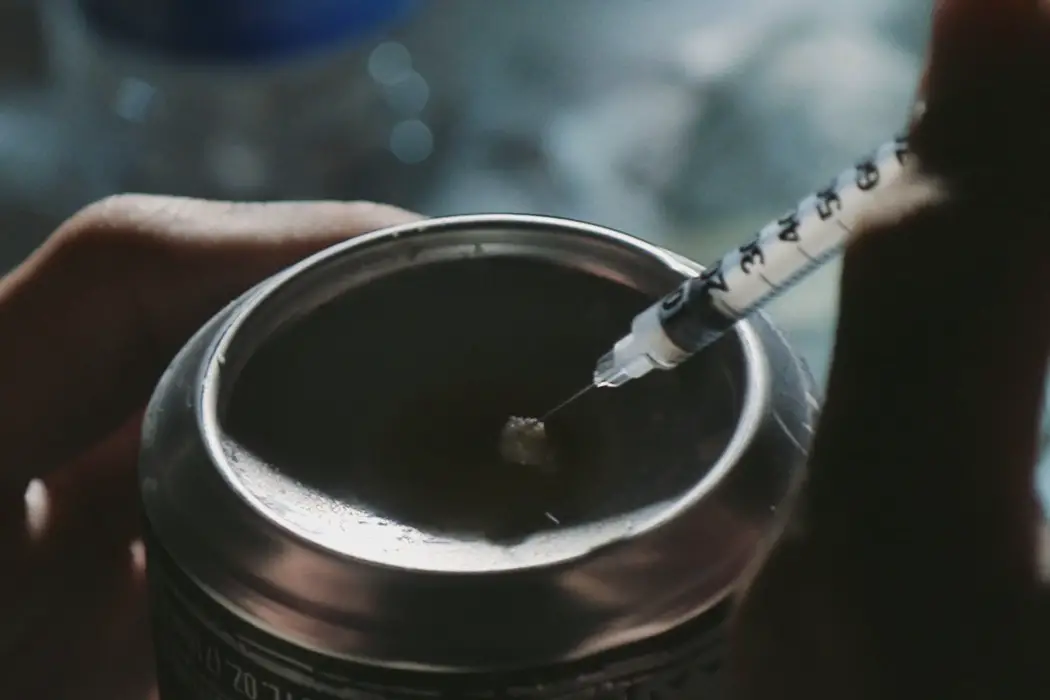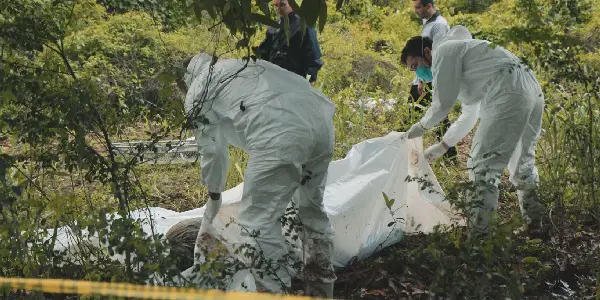Sheffield Doc/Fest 10: THE TRADE: An Exposé Of The Highest Calibre (& Interview With Director Matthew Heineman)

Musanna Ahmed is a freelance film critic writing for Film…
One of the great documentary filmmakers working today, Matthew Heineman pulls no punches when it comes to capturing what’s necessary to tell his stories. He made his name known with Cartel Land, a highly absorbing story of a paramilitary group warring with drug cartels at the Arizona border. It went on to be nominated for an Oscar. He followed it up with another tour de force, City of Ghosts, about a group of Syrian activists reporting on the city of Raqqa as it’s hijacked by ISIS. It went on to be robbed of an Oscar.
The Trade review
The Trade takes him back to drug war territory. The miniseries sprawls across the USA and Mexico, in the cities of Guerrero, Atlanta, and Columbus, in an interconnected way similar to epic geo-political features such as Traffic and Syriana. Shrinking from a hornet to a fly on the wall, Heineman and his crew minimise the talking heads and voiceovers of his previous films for mostly pure observation.

The Trade represents a departure from Heineman’s one-man shooting style, where he’s in the heart of the action. For the geographically ambitious narrative of this project, as he tells me in the interview below, he sought several cameramen who had a similar aesthetic. Their work can be enthusiastically approved by any fan of the filmmaker, for the chosen team of DP’s have successfully executed his vision. The level of access and on-screen content is as remarkable as anything in Heineman’s stunning filmography.
As aforementioned, The Trade plays out like films like Traffic and Syriana in how it takes cues from fiction for its narrative structure, seamlessly cutting back and forth between multiple stories and following a select group of characters who are affected – and ultimately connected – by the global web of opioid distribution. In a golden age of television, The Trade is yet another work with all the cinematic appeal of a multi-million dollar production.
The undisturbed footage depicts heroin addicts shooting up, helpless with their inability to stop. It depicts a sicario discussing the one and only time he felt bad about murdering a man. That man had an unforgettable scream and plead with the sicario to save him but the sicario “had to” kill him and “that’s the way it goes.” Extremely grisly footage of cartel murders show that, like with City of Ghosts, this is a filmmaker who uses unflinching footage to depict the truly awful extent that these geo-political issues have reached. Somebody has to tell the complete story.

There’s some levity in the form of the light-hearted interactions between the policemen in the midst of their operations. It’s much needed after, earlier in the same episode, we hear harrowing phone calls of parents calling the cops after seeing their children overdosed. These phone calls are yet another example of the unbelievably close access gained by the filmmakers.
It raises the question of how every party agreed to be on and, once you’ve seen it, the answer is simple – the camera allows everybody involved to let the world understand who they really are, which in turn lets the audience decide and interpret the endlessly messy situation for themselves. The whole picture is always vital but especially when showing a crisis with no tangible solutions. The Trade is an exposé of the highest calibre and a masterclass of documentary filmmaking.
Interview with Matthew Heineman
Matthew Heineman was at the festival primarily as the guest of this year’s BAFTA Masterclass. I caught up with him before he participated in the session and talked about various aspects of his career including his goals for The Trade, future projects, and his advice for aspiring filmmakers.

Musanna Ahmed for Film Inquiry: You’re back in Sheffield one year after City of Ghosts won the Grand Jury Prize at the Doc/Fest. Do you have any updates on the story of that film? Are you still in touch with the characters?
Matthew Heineman: Yes, I still stay in touch with them. They’re still operating and doing their thing. Everyone in the film is still alive.
The Trade is a different approach for you with the multiple DP’s required across a number of places around the USA and Mexico. How did it work?
Matthew Heineman: It worked well and was definitely a totally different experience for me not to be there. It was all about trying to find people with the same aesthetic and philosophy on filmmaking. Most of them were people who I had worked with in the past.
It’s also different because of the lack of talking heads and interviews. The aesthetic reminded me of these epic geo-political features like Traffic and Syriana. Could you tell us more about the new direction?

Matthew Heineman: There’s not too many differences. I generally try to avoid talking heads in all my films… there was a little bit of that on camera in City of Ghosts. Cartel Land was heavy on the vérité, character-driven filmmaking like The Trade so I don’t think it was a huge departure for me. I felt there was a much larger story to be told after Cartel Land so I wanted to explore similar themes and take certain ideas further but keep the same aesthetic.
You always gain incredible access for your documentaries and have mentioned that people want to be part of your films because they want to share their stories. Have the subjects of The Trade seen the film?
Matthew Heineman: Some of them have. We’ve tried to get as many of them as possible to see it. I think people take part in films like this for a variety of different reasons but they want the world to understand what they’re going through. My goal with The Trade was to take this issue of the opioid epidemic, which is so often relegated to headline stats, and put a human face to it, to humanise the issue in a way that I don’t think other pieces of media have.
Between Cartel Land and The Trade, you’ve poured years of your life into investigating the opioid epidemic and I’m wondering if you have any intentions to continue to make films about this subject matter?
Matthew Heineman: Probably not. I feel like I’ve done my thing and am ready to move on to other subjects.

I imagine it must take a toll on you.
Matthew Heineman: Every film changes you and touches you and that’s why you make them. At least for me, it’s such a privilege and an honour to dive into these subjects and get immersed into a world every couple of years. I love exploring these worlds but I also feel a huge responsibility in telling these stories. I didn’t know much of the drug trade before The Trade and have obviously learned a tonne in making it but I don’t consider myself an expert or consider that these films/shows are a solution to the problem. They’re exposés on these large issues and subjects.
You executive produced When Lions Become Lambs, which is also screening in Sheffield.
Matthew Heineman: Yeah. Jon (Kasbe) is an incredible filmmaker and Tom Yellin, who produced Cartel Land with me, produced When Lions Become Lambs. It’s a film that I wanted to support in every way I could and Jon is an incredibly talented individual. I’m very proud to be associated with the film.
When you make a documentary like The Trade, where it’s heavily observational, how much responsibility do you feel to help the people in front of the camera who are clearly helpless?
Matthew Heineman: That’s a very difficult thing that you navigate with sensitive and care and it depends on the situation too, it’s not a question I could answer with a blanket statement. I can’t fix the problems of the individuals in the film – that’s not my job – but my job is to expose what’s happening and, in doing so, hopefully create a much greater sense of empathy for what they’re going through. Maybe in doing that then other people in positions of power can help make change by seeing something that they may not have seen before.
You have a feature film, A Private War, in the works.
Matthew Heineman: Yeah and that’s why I haven’t slept in about a month and am here for 5 hours before flying back to the editing room. We’re locking on Wednesday (13 June).

What can you tell us about the film?
Matthew Heineman: It’s a feature about Marie Colvin, a journalist who was killed in Syria, and about her addiction to covering war and what that did to her personally. It’s a world that I can relate to and it feels like a very natural extension to the work I’ve previously done albeit with actors. Still, I try to approach it the same way I approach any project.
That’s interesting because I can see a parallel of Marie Colvin and yourself because audiences know you for being right there in the heart of dangerous situations when making your docs. Are you willing to die for your art?
Matthew Heineman: I’ve made films that have taken me to dangerous places but I don’t use films as a way to go to dangerous places. It’s always about the story and, like Marie, I feel a huge responsibility to tell these stories so that’s what always has driven me and it’s happened to drive me to certain places that I could never have imagined going to. But it’s always in pursuit of the story.
What else do you have in the works?
Matthew Heineman: Just trying to finish A Private War and am about to start work on the second season of The Trade. I can’t say what it’s about yet but it’s a different topic with a similar approach.

Finally, since you’re delivering the BAFTA Masterclass at the Doc/Fest this year, what’s the best piece of advice you have for aspiring filmmakers?
Matthew Heineman: I often struggle with this question but we’re so lucky to live in a world where access to technology has been democratised and anyone with a camera can tell a story, so go out there, find stories that matter to you and get your hands dirty. I never went to film school or read any books, it’s all been based on instincts so I’d also say follow your instincts. It’s cliché to say these things but my favourite documentaries are character-driven documentaries so it’s about finding the right characters and subjects that inspire you, that scare you, that move you so you can explore the complexities of the human condition. Explore stories that aren’t black and white because the world isn’t black and white.
Film Inquiry would like to thank Matthew Heineman for his time and insight.
Viewers in the US can watch all episodes of The Trade on Showtime Now and YouTube. The series had its UK premiere at the Sheffield Doc/Fest, a general release date will be announced in the future.
Doc/Fest 10 is a series of combined review and interview features for ten films seen at the Sheffield International Documentary Festival 2018. You can view the rest of the features by clicking here.
https://www.youtube.com/watch?v=hSh9go26awE
Does content like this matter to you?
Become a Member and support film journalism. Unlock access to all of Film Inquiry`s great articles. Join a community of like-minded readers who are passionate about cinema - get access to our private members Network, give back to independent filmmakers, and more.
Musanna Ahmed is a freelance film critic writing for Film Inquiry, The Movie Waffler and The Upcoming. His taste in film knows no boundaries.













